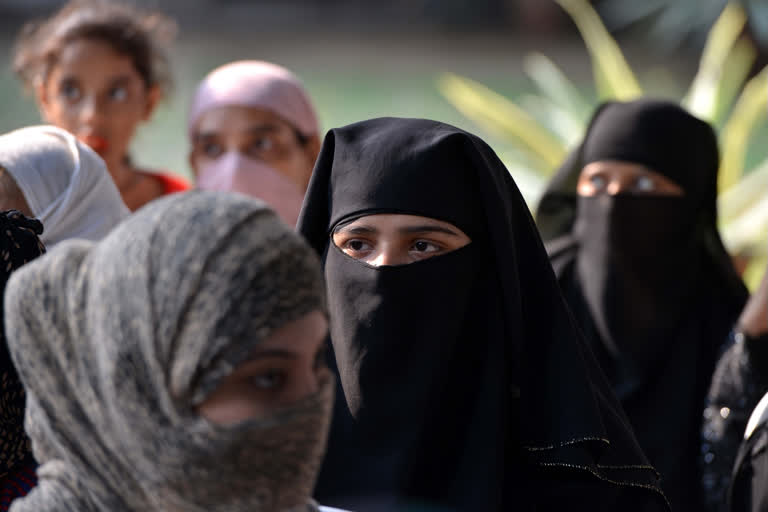Hyderabad:The triple talaq Bill, which criminalises instant divorce in the Muslim community , was passed by the Rajya Sabha on Tuesday, with 99 members voting in favour and 84 against it. It was passed by the Lok Sabha last week.
What is Triple Talaq?
There are three forms of talaq (divorce): Ahsan, Hasan and Talaq-e-Biddat (triple or instant talaq). Ahsan and Hasan are revocable. Biddat — pronouncing divorce in one go by the husband — is irrevocable.
Biddat is considered ‘sinful,’ but permissible in Islamic law.
The All India Muslim Personal Law Board (AIMPLB) holds that for the Hanafis, who make up more than 90% Sunnis in India, triple talaq is a matter of faith followed for 1,400 years.
How did it come about?
The Supreme Court questioned whether Muslim personal law practices of marriage and divorce reduce women to mere chattels on 16, October 2015. In a rare move, it registereda suo motu public interest litigation (PIL)petition titled ‘In Re: Muslim Women’s Quest for Equality’ to examine whether arbitrary divorce, polygamy and Nikah Halala (where a Muslim divorcee marries a man and divorces him to get re-married to her former husband) violate women’s dignity.
The court rued missing the opportunity to address the question of gender inequality in both the Shah Bano and Danial Latifi cases. In the Shah Bano case, the court merely goaded the government to frame the Uniform Civil Code. In the Latifi case, it upheld the right of Muslim women to maintenance until Re-Marriage.
Many Muslim women and organisations backed the court’s initiative. However, a Constitution Bench decided to confine itself to examining triple talaq and not polygamy and Nikah Halala.
Why does it matter?
This has been an issue of concern for over 65 years for Muslim women, who comprise approximately8% of the population as per the 2011 census. “Muslim women want to have a life equal to that of another woman, say a Christian or Hindu wife,” the government argued in court.
The Centre claimed that instant talaq is not fundamental to Islam. It promised to bring in new divorce law for Muslim men in case the court strikes down the three forms of talaq.
The government argued that Muslim marriage and divorce is codified under Section 2 of the Shariat Act of 1937and came within the ambit of ‘law’ under Article 13 of the Constitution. Hence, they should abide by the principles of dignity and non-discrimination.
The AIMPLB countered that triple talaq is a matter of faith like the Hindu belief that Ayodhya is Ram’s birthplace.
The courts and the government should leave reforming of the law to the community, it said, quoting the Bombay High Court’s unchallenged decision in the Narasu Appa Mali case that personal law should not be tinkered with. Where will Muslim men go for divorce if you (the court) strike down talaq and Parliament refuses to pass a new law, the AIMPLB asked.
What next?
Justice Kurian Joseph, a judge on the Constitution Bench, ignited a spark by suggesting an alternative that a Muslim bride, at the time of the wedding, should be allowed to lay down a condition in the 'Nikahnama' that she would not be subjected to instant talaq in case the marriage hits a rough patch.
Days after the court reserved the case for judgment, the AIMPLB filed an affidavit saying that it would issue a public advisory to qazis to advise bridegrooms against instant talaq and also add a condition in the 'Nikahnama' to exclude instant talaq.
The AIMPLB even threatened the social boycott of Muslim men who resort to instant talaq.
Starting of the controversy
A campaign to end the practice of unilateral instant "triple talaq" began in India several decades ago. But it picked up steam when a 35-year-old mother-of-two approached the Supreme Court seeking justice.
In 2016, Shayara Bano filed a petition stating that she received a divorce letter (Talaqnama) from her husband when she visited her parents home for medical treatment. Her attempts to meet her husband and children were unsuccessful.
SHAYARA BANO CONTROVERSY:
Why this fight?
Shayara Bano was the original petitioner in the case after she approached the court in 2016 demanding that the Talaq-e-Biddat pronounced by her husband be declared as void.
She also contended that such unilateral, abrupt and irrevocable form of divorce be declared unconstitutional, arguing that the practice of triple talaq violated the fundamental rights of Muslim women.
“Since my student life, I didn’t like the anti-women social traditions like triple talaq and Halala. But when it happened to me... it [the dislike] grew. Normally, these things do not happen, but when it hits you, you realize how bad this practice really is,” said Bano.
What happened to her?
Her battle against triple talaq was spurred by her own experience. In April 2001, she was married to the Allahabad-based property dealer Rizwan Ahmed, who allegedly demanded additional dowry and a car from her parents.
She endured domestic violence and physical torture from her husband and in-laws.As per her claim, she was often beaten and kept hungry in a closed room for days.
On October 2015, her husband sent her a divorce note claiming instant Triple Talaq by speed post. The custody of her two children was kept by her husband. When something “so wrong” happened, she thought that there must be a law to prevent this.
Did she face challenges?
